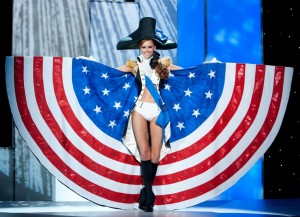
I’ll be debating the Miss Universe pageant, my thoughts on which were outlined here a few years ago. But if you have CNN International, tune in! And if you have thoughts pre-debate, leave them in the comments — would love to hear any information or arguments I may not have thought through. Here, basically, is my position:
The feminist arguments against beauty pageants are obvious, and have been around even before the famous 1968 demonstrations at the Miss America pageant in Atlantic City, which spawned that impossible-to-kill myth of feminist bra-burning. But in 2007, when women are attending college and grad school in record numbers, when the first female Speaker of the House is in power, and when women have unprecedented access to almost all professional fields, why are we still playing dress-up for money?
Despite achieving simple legal equality, women still lag behind when it comes to the higher-up positions in business, law, academia and politics. Our basic right to bodily autonomy is on the chopping block, as more anti-choice legislation and jurisprudence is introduced every year, sending the very strong message that our bodies are not just ours. Beauty is still one of the most valued characteristics a woman can have, and images of beautiful women bombard us every day. Is it any surprise that, in a culture which views women as objects to look at and vessels for reproduction, women will try to use the emphasis on their bodies to their own benefit?
Women are not stupid. We are rational actors who respond accordingly to our environments. From the time we’re little girls, we’re bombarded with images that reflect a very narrow standard of female beauty, and emphasize the idea that beauty (or at least the attempt to be beautiful) is a basic requirement of successful womanhood. If you happen to be blessed with the features that are culturally idealized (whiteness and thinness, among others), why not use it and make some money off of what so many other women do for free, and to feel good about yourself to boot?
Certainly plenty of women like dressing up, and like the ritual of putting on make-up and doing their hair and feeling pretty. Wanting to be perceived as attractive is no great sin, and isn’t strictly a woman’s concern. The difference, though, is that being attractive is considered much more important for women than it is for men, and women are required to spend much more time, effort and money on their physical appearance. While marketers are no doubt trying to breed male insecurity in order to push more product, women still dominate when it comes to the purchase of beauty-related goods. Women still spend millions on make-up, hair care, and lotions and potions claiming to do everything from eliminate wrinkles to get rid of cellulite to plump up breasts and lips. Women still make up most of the plastic surgeries performed each year. Women still account for the vast majority of people with eating disorders. Women are still the primary funders of the diet industry.
There is no shame in being one of the millions of American women who live in this culture and who structure their lives accordingly. I’m one of them. So are the women in the Miss USA pageant. Feminists have been leveling thorough and valid criticisms at beauty contests and consumer beauty culture for more than 40 years, and yet the contests persist. Women continue to participate in them, and we continue to watch them on TV. It’s no big mystery as to why: Beauty contest participants reap great financial benefits when they win, and American viewers are fully accustomed to evaluating and watching women for pleasure.
Ideally, beauty contests will eventually go the way of the dodo. The Miss USA pageant is not, by any stretch, good for feminism or good for women as a class. But it’s not happening in a vacuum. For 40 years, feminists have been arguing that pageants are a small part of a larger-scale system of oppression which positions women’s bodies as objects to serve others — to give them pleasure, to make them money, to sell their product, to birth their baby. While many Americans have duly noted beauty pageants to be silly and outdated, we often fail to recognize how they operate within a greater context of generalized and widely accepted misogyny.